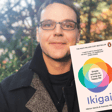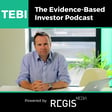
TEBI podcast 43: Brian Portnoy on the “evolutionary two-step”: why you first need to survive, then thrive, with your money
In the third of a series of 12 TEBI episodes looking at meaning and money during later careers or second lives, Jonathan Hollow interviews writer, educator, investor and Chartered Financial Analyst Brian Portnoy. Brian discusses the concept of "funded contentment" as true wealth, contrasting it with the pursuit of "riches". He explores the four universal sources of deep contentment: connection, control, competence, and context. Brian emphasises the importance of addressing our basic needs, and protecting ourselves, before trying to fund more aspirational goals.
This conversation will encourage you to reflect on what is "enough” for you to pursue your own meaningful life.
This podcast series has been developed with financial planning firm Mulberry Bow. Based in London, they offer a highly personalised service to around 150 individuals and families. Robin Powell and Jonathan Hollow are very grateful for their enthusiastic support for "Second Lives”.
Transcript of this episode: https://ow.ly/bFhA50PeVx5 --Links to key mentions in this podcast:
“The Investor’s Paradox” https://www.amazon.co.uk/Investors-Paradox-Simplicity-Overwhelming-Choice/dp/113727848X—
“The Geometry of Wealth” https://www.amazon.co.uk/Geometry-Wealth-Shape-Money-Meaning/dp/0857196715/--
Shaping Wealth https://www.shapingwealth.com/ --
Mulberry Bow financial planners: https://mulberrybow.com/ --
How To Fund The Life You Want: http://tinyurl.com/how2fund --















